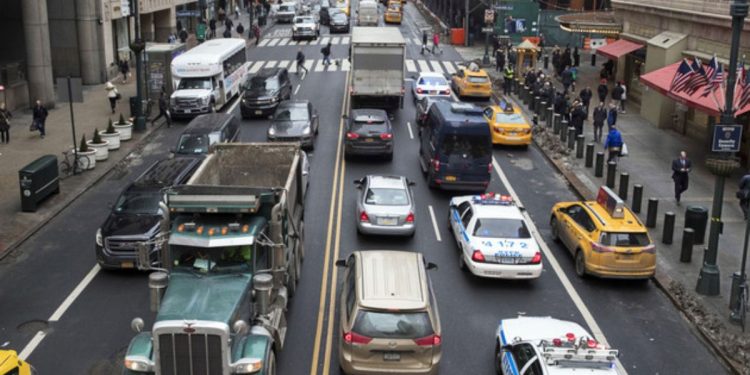State lawmakers swiftly rejected Governor Kathy Hochul’s proposal to raise a tax on New York City firms to recover money from congestion pricing fees.
Four people confirmed to POLITICO on Thursday that the payroll mobility tax increase was deemed a non-starter in the Democratic-led state Senate, making it nearly impossible for the package to pass.
“It’s insane to do that right now,” Long Island state Sen. Kevin Thomas told reporters following a closed-door meeting of Democratic lawmakers.
And time is running out to find an agreement: the state Legislature is scheduled to finish its business for the year on Friday and not return to Albany until January.
In fact, Hochul’s latest idea may be even more politically unpalatable than the congestion pricing scheme she abruptly abandoned in the first place, lawmakers say.
Rejecting a payroll tax hike to offset lost revenue raises concerns about the future of mass transportation capital upgrades.
After withdrawing support for the toll plan, which would have cost vehicles $15 to enter Manhattan below 60th Street, Hochul proposed raising the tax hours, according to three officials briefed on the idea and granted anonymity to discuss sensitive discussions.
The Metropolitan Transportation Authority’s $15 billion capital plan, which would fund infrastructure improvements, estimated that congestion pricing would produce approximately $1 billion. The proposed payroll tax increase would have collected an additional $1 billion, according to senators briefed on the plan.
The governor’s decision to withdraw from the congestion pricing plan, a surprise move designed to help Democrats in tight House contests, has put hundreds of repair projects in the MTA’s service region on hold.
Over the last two days, lawmakers have been scrambling to explore a variety of alternatives for replacing toll income, including one that would have combined the payroll tax increase with a suite of environmental laws.
“We had a funding stream for the MTA,” said Senate Finance Chair Liz Krueger, who criticized Hochul’s decision.
Business CEOs who previously supported congestion pricing slammed the proposed payroll tax increase.
“Congestion pricing spreads the MTA funding burden equitably across all the constituencies that benefit from the mass transit system that supports the tri-state regional economy,” the Partnership for New York City, a regular Hochul ally, said in a statement. “The [payroll tax] burden falls entirely on New York City, which is already the most heavily taxed city in the nation. The governor should allow congestion pricing to proceed.
And it’s unclear whether any alternatives can provide additional money.
According to a statement released Thursday by the New York City Independent Budget Office, delaying congestion pricing forever “halts decades of policy and implementation work representing unquantifiable amounts of time, money, and other resources.”










